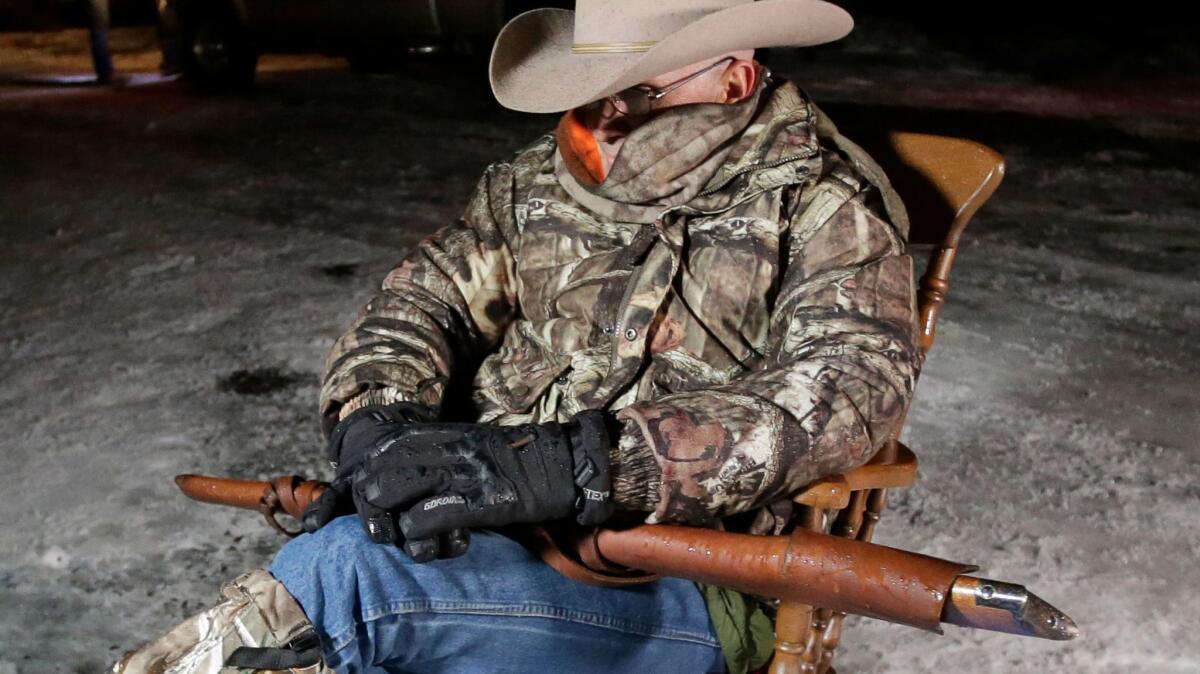Opinion: In acquitting the Oregon militants, a white jury determines that the law doesn’t apply to white protesters

- Share via
Remember that group of militants that staged an armed standoff in Oregon last winter? You know, the one where they occupied the Malheur National Wildlife Refuge for six weeks, vowing that if the government were to raid the occupation it would risk a “conflagration so great, it cannot be stopped, leading to a bloody, brutal civil war”?
Well, those folks were just found not guilty of conspiring to impede federal workers from doing their job at the refuge.
The Malheur occupation was complicated; here’s a topline refresh of what happened.
In 2012, two ranchers, Dwight Lincoln Hammond Jr. and his son Steven Dwight Hammond, were convicted of setting fire to more than 139 acres of land owned by a federal agency, the Bureau of Land Management, after illegally hunting deer on it. What punishment did the trial court give them? Three months in prison for Dwight, and one year and one day in prison for Steven Hammond. What was the problem with that? There’s a mandatory minimum sentence of five years for committing arson on federal land, so the U.S. Court of Appeals had to overrule the judge’s lenient sentencing and bump it up.
Then a group of anti-federalist protestors showed up at Malheur to demonstrate their fury at the Hammonds’ sentencing. They brought dozens of guns, 15,000 rounds of ammunition, and occupied the offices of federal workers for 41 days. Ammon and Ryan Bundy, the group’s leaders, are extremist Mormons with messiah complexes; one refers to himself as Captain Moroni, an anti-government leader associated with the “title of liberty” in the Book of Mormon. (The Mormon Church at large wants nothing to do with the Bundys; they strongly condemned the action, saying, “This armed occupation can in no way be justified on a scriptural basis.”) Ammon Bundy’s lawyer has said he believed it was “their right to recover land wrongfully taken by the U.S. government.” However, Bundy doesn’t consider himself an anarchist; he’s part of the disaffected hard-right movement that connects to Trump, the candidate his father, Cliven Bundy, has publicly endorsed.
A number of Republicans have been leading voices in the movement to address over-incarceration. But there are vocal elements within the party that cling to this notion that mandatory minimums improve public safety, even though the United States Sentencing Commission documented that mandatory minimum sentences are applied disparately, and the “available data strongly suggest that a mandatory minimum is applicable appears to be related to the race of the defendant, where whites are more likely than non-whites to be sentenced below the applicable mandatory minimum.” That research was released in 1991 — 25 years ago — and has been reinforced by innumerable studies since.
And yet, here’s what the 2016 Republican party platform says on the subject:
In the past, judicial discretion about sentences led to serious mistakes concerning dangerous criminals. Mandatory minimum sentencing became an important tool for keeping them off the streets.
In line with the Republican party platform’s hard stances on immigration and criminal justice, Trump said that on his first day in office he’d put a law before Congress to “ensure that criminal aliens convicted of illegal reentry receive strong mandatory minimum sentences.” The co-chair of Trump for President Veterans’ Coalition, Gerald DeLemus, participated in the Malheur standoff.
So the issue, it seems, in the eyes of these hard-right protestors isn’t the legal application of mandatory minimums, but those rare instances when those mandatory minimums punish the “wrong people,” rather than the communities of color they were designed to impact. Damnit! Feels like stepping into a bear trap you personally set, am I right?
When people of color are locked up for minor crimes — X time in jail for carrying Y amount of weed, for instance — that’s the application of law and order. But when white people are locked up for substantive crimes — setting fire to 100 acres of land owned by the government, for instance — that’s an infringement of rights they believe they should have.
Look, I get it: I can’t understand why I, a white person, can’t just go around setting fire to 100 acres of your land, so long as I believe it should actually be my land. And if, for God knows what reason, I received the minimum punishment under the law for burning all your stuff down, I sure as hell hope that dozens of my friends would show up with guns and stage an illegal occupation for six weeks. And if my friends got brought to court for staging that occupation, I sure as hell would hope they get off with no convictions, as the six protestors charged did last night. Freedom, baby. Well, freedom for us. Law and order for “them.”
Can you hear how entitled, how insane, how racist that is?
In the course of this election season, a number of commentators and analysts have made the point that when you’re accustomed to privilege, equality feels like oppression. When white men got in trouble for setting government property on fire, it was their oppression. When those white men’s white supporters set their base in the office of one of the refuge’s only female employees, it was their right. And when the white leaders of this illegal armed occupation movement were found “not guilty” by an all-white jury last night, it was our confirmation that privileged treatment in the eyes of the law is white America’s enduring inheritance.
Melissa Batchelor Warnke is a contributing writer to Opinion. Follow her on Twitter @velvetmelvis.
Follow the Opinion section on Twitter @latimesopinion and Facebook
More to Read
A cure for the common opinion
Get thought-provoking perspectives with our weekly newsletter.
You may occasionally receive promotional content from the Los Angeles Times.











